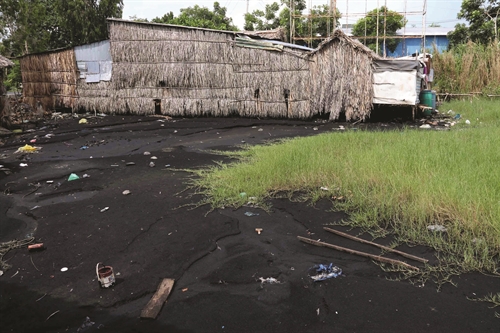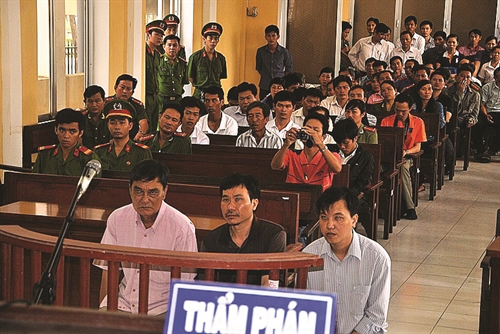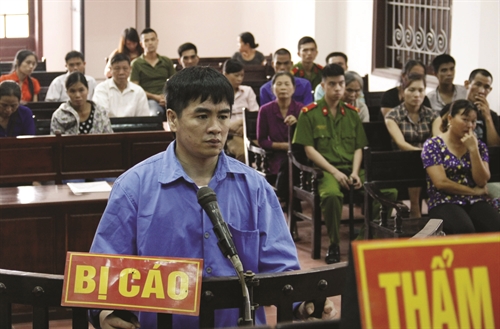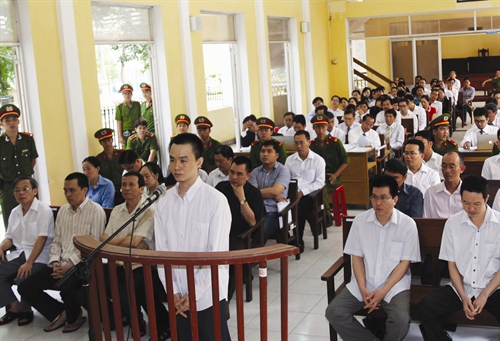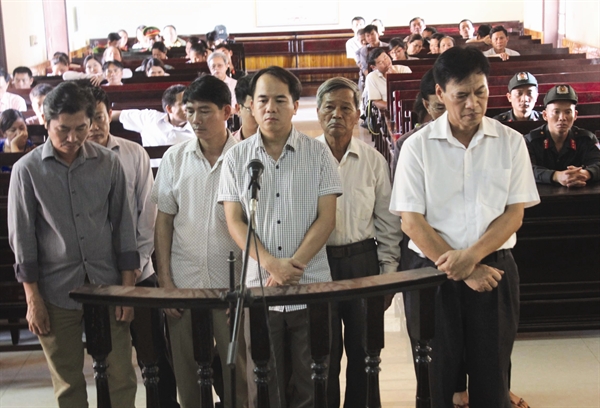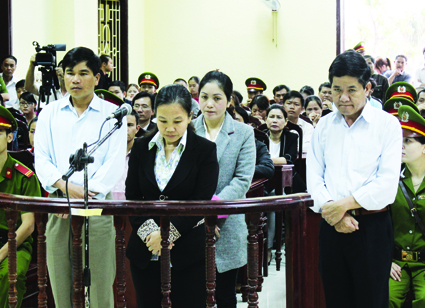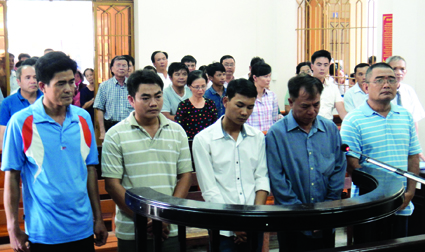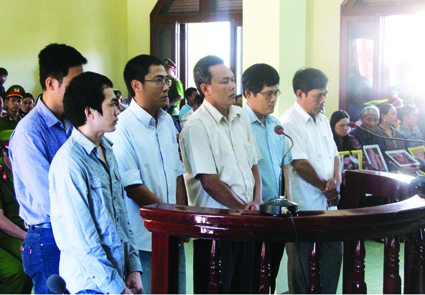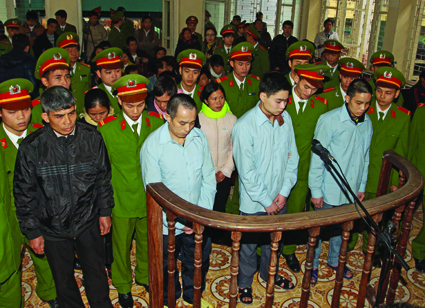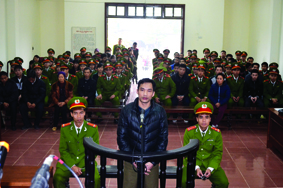>>Penal liability of legal entities under revised Penal Code: an initial analysis
Nguyen Cong Long
National Assembly Office
Provisions on offenders aged under 18 years (under-18 offenders) are among the most noteworthy of the 2015 Penal Code (the 2015 Code). In drafting the 2015 Code, the Government stuck to three main guidelines:
- Guaranteeing the best interests of minors in the spirit of the United Nations Convention on the Rights of the Child (the Convention);
- Prioritizing the application of alternative measures to minors before deciding on examination of their penal liability; and,
- Upholding the principle that imprisonment is applied to minors only after the application of judicial measures is considered in conformity with the spirit of Article 37 of the Convention.[1]
This spirit has been incorporated in the provisions of the 2015 Code in both content and terminology. Accordingly, the title of Chapter XII and all relevant provisions in the 2015 Code now use the term “under-18 person” in replacement of the term “minor.” This aims to ensure uniform application and consistent understanding and application of different terms referring to under-18 persons currently used in different laws, such as “minor” in the Civil Code or “child” in the Law on Child Protection, Care and Education.
Below are the main contents of the 2015 Code’s provisions on under-18 offenders.
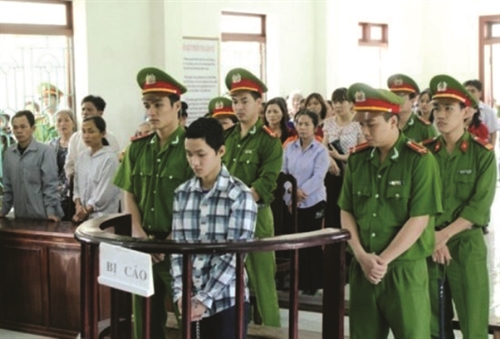 |
| Under 16-year defendant Vu Anh Thu (HA Trung district, Thanh Hoa province) is sentenced to 12 years' imprisonment for murder and plundering property__Photo: Internet |
Scope of penal liability to be borne by under-18 persons
The 1999 Penal Code prescribes the scope of penal liability to be borne by under-18 persons based on two age groups and types of committed crimes: (1) Persons aged full 16 years or older have to bear penal liability for all crimes they commit; and (2) persons aged full 14 years to under full 16 years have to bear penal liability for very serious crimes they intentionally commit or for particularly serious crimes.
Accordingly, persons aged full 16 years or older have to bear penal liability like adults. However, persons in the second age group are also subject to a large scope of penal liability. By the method of determining penal liability based on types of committed crimes, these persons have to bear penal liability for crimes infringing upon national security, crimes against the mankind or economic crimes, including crimes committed by special subjects like position-related crimes and crimes infringing upon judicial activities. Reality shows that it is unreasonable to prescribe penal liability of under-18 persons for these crimes.
At the 9th and 10th sessions of the XIIIth National Assembly (NA), there were hot debates on the proposed amendments to the Penal Code’s provisions concerning under-18 offenders. Some opinions held that the provisions on the age groups of juvenile offenders who must bear penal liability should not be changed. Others suggested a lower age group, i.e., full 12 to under 16 years, citing the reason that persons of such age could easily commit crimes by taking advantage of scientific and technological advances, especially in information technology.
However, most NA deputies held that the lowering of the age of juvenile offenders to bear penal liability did not conform with the Vietnamese humanity tradition, the principle of criminal justice applicable to juvenile offenders, i.e., prevention and education, and the current process of international integration. Most NA deputies and collected public opinions favor that it is time to change from determining penal liability of under-18 offenders based on types of crimes to specifying crimes for which they have to bear penal liability. Their opinion was based on the practice of penalization of under-18 offenders, the perception capacity of these offenders and the types of crimes they frequently commit. According to this set of opinion, the new way of determining penal liability of under-18 offenders would guarantee transparency and humanity in the penalization of juvenile offenders in the spirit of the 2013 Constitution and the Convention. It would also create a foundation for individualizing the penalization of under-18 offenders[2] and help remove the irrational provision that persons aged 14 years to under 16 years have to bear penal liability for crimes like high treason, spying, offering or taking bribes when they are still too young to fully perceive their criminal acts as well as have no conditions for committing such a crime.
As a result, Article 12 of the 2015 Code sees some significant amendments. There are still two age groups subject to penal liability but within a much narrower scope.
Firstly, persons aged full 16 years or older have to bear penal liability for all crimes they commit. However, Clauses 1 and 2 add the exception of “crimes otherwise prescribed by this Code.” In other words, although these persons have to bear penal liability like adults, they are entitled to penal liability exemption in many specific crimes involving offenders who must be aged full 18 years or older. Such crimes include having sexual intercourse or taking other acts of sexual intercourse with persons aged full 13 years to under 16 years (Article 145); obscenity against persons aged under 16 years (Article 146); and using persons aged under 16 years for pornographic purposes (Article 147).
Secondly, persons aged full 14 years to under full 16 years have to bear penal liability for two types of crime:
- Type 1: Crimes infringing upon life, health, honor, dignity and property, regardless of their seriousness. Due to the particular danger of these crimes and the perception capacity of offenders committing these crimes, juvenile offenders have to bear penal liability for these crimes even in case their criminal acts are categorized as less serious. This type includes seven crimes, including murder; intentionally inflicting injury on or causing harm to the health of other persons; rape; rape against persons aged under 16 years; forcible sexual intercourse with persons aged full 13 years to under 16 years; plundering property; and kidnapping in order to appropriate property;
- Type 2: This type includes 22 crimes which are now frequently committed by persons in this age group. Depending on the characteristics of social relations infringed upon by these crimes and extent of their consequences, young offenders in this age group have to bear penal liability if their criminal acts are considered very serious or particularly serious. This means that only persons aged full 14 years to under 16 years committing a crime which is very or particularly dangerous and subject to a penalty ranging from over 7 years to 15 years, or from over 15 years to 20 years in prison, or life imprisonment or death, have to bear penal liability. Such a penalty is usually prescribed in the second or subsequent clause of the articles on the following crimes:
+ Infringing upon the honor or dignity of other persons: forcible sexual intercourse (Article 143); trafficking in persons (Article 150); and trafficking in persons aged under 16 years (Article 151);
+ Infringing upon property ownership: extortion of property (Article 170); property robbery by snatching (Article 171); stealing property (Article 173); and destroying or deliberately damaging property (Article 178);
+ Narcotics-related crimes: illegally producing narcotics (Article 248); illegally stockpiling narcotics (Article 249); illegally transporting narcotics (Article 250); illegally trading in narcotics (Article 251); and illegally appropriating narcotics (Article 252);
+ Infringing upon traffic safety: organizing illegal motor races (Article 265); and illegal motor racing (Article 266);
+ Crimes related to information technology and telecommunications network: Manufacturing, trading in, exchanging or donating tools, equipment or software for use for illegal purposes (Article 285); spreading software harmful to operation of computer networks, telecommunications networks or electronic appliances (Article 286); obstructing or causing disorder in the operation of computer networks, telecommunications networks or electronic appliances (Article 287); hacking (Article 289); and using computer networks, telecommunications networks or electronic appliances to appropriate property (Article 290);
+ Infringing upon public security: Terrorism (Article 299); destroying important national security facilities (Article 303); illegally manufacturing, stockpiling, transporting, using, trading in or appropriating military weapons or technical equipment (Article 304).
Also under the above-mentioned principle, the provisions on preparation for crime commission (Clause 3, Article 14) are amended that persons aged full 14 years to under 16 years must be penalized even when they are preparing for committing crimes of spontaneous and highly dangerous nature, such as murder (Article 123); intentionally inflicting injury on or causing harm to the health of other persons (Article 134); plundering property (Article 168); and kidnapping in order to appropriate property (Article 169).
Penalization of under-18 offenders
Under Article 70 of the 1999 Penal Code, in addition to penalty, the court may only apply either of the judicial measures to convicted under-18 persons: education in communes, wards or townships and sending to reformatory schools. Since both measures fall under court jurisdiction, under-18 offenders have to undergo all criminal proceedings which might have negative effects on them. To avoid this, Chapter XII of the 2015 Code contains many new provisions on principles, specific measures and applying competence.
In this chapter, Article 91 reaffirms the traditional humanity principles emphasizing on education of under-18 offenders, such as guaranteeing the best interests of under-18 persons and aiming mainly to educate and help them redress their wrong doings, develop healthily and become citizens useful to the society; not imposing life imprisonment or death penalty on under-18 offenders, etc. Moreover, the principles of penalizing under-18 offenders enshrined in the Convention, especially those established in UNICEF’s Toolkit on Diversion and Alternatives to Detention, have been translated into domestic regulations. Although the provisions on punitive measures prescribed in Chapter XII of the 2015 Code and definitions in the Toolkit are not entirely consistent, it can be said that the idea, contents and requirements of “alternative measures” have been incorporated into provisions on penal liability exemption and application of educational punitive measures to under-18 offenders. Under the 2015 Code, the penalization of under-18 offenders may take one of the following forms:
Penal liability exemption and application of supervision and education measures
Regarding the scope of application, under-18 offenders who are ineligible for penal liability exemption provided in Article 29 but have many extenuating circumstances and have voluntarily remedied their crimes’ consequences may be exempted from penal liability and subject to supervision and education measures, if they (i) are aged full 16 years to under 18 years and commit a less serious or serious crime[3]; (ii) are aged full 14 years to under 16 years and intentionally commit a very serious crime[4]; or (iii) are aged under 18 years and act as accomplices with a minor role in the case (Article 91).
Regarding the applying competence, to meet the requirement to keep under-18 offenders away from criminal proceedings as soon as possible, Article 92 provides that investigative agencies, procuracies and courts all have competence to apply these measures at the stage they accept the case.
As for the application condition, if under-18 offenders or their lawful representatives agree, these agencies may decide on penal liability exemption and apply the following supervision and education measures:
(1) Reprimand (Article 93): This measure is applicable to persons aged full 16 years to under 18 years committing for the first time a less serious crime or persons aged under 18 years acting as accomplices with a minor role. In order to help them be fully aware of their crimes and consequences caused to the community and society, and their obligations, reprimand must be applied in the presence of parents or lawful representatives of the offenders. At the same time, reprimanded persons are obliged to abide by law, internal rules or regulations of their places of residence, work or study; present themselves at competent agencies when so requested; participate in learning or job-training programs organized by local administrations and labor in appropriate forms. The measure-applying agency may set a time limit of three months to one year for performance of the above obligations.
(2) Community-based conciliation (Article 94): This measure is applicable to persons aged full 16 years to under 18 years committing a less serious crime or serious crime or persons aged full 14 years to under 16 years committing a very serious crime as prescribed at Point b, Clause 2 of Article 91. Agencies competent to apply this measure (investigative agency, procuracy and court) have to work with commune-level People’s Committees in holding a community-based conciliation when victims or their lawful representatives are willing to have conciliation with and request penal liability exemption for offenders. Offenders subject to this measure have to give apologies to their victims, pay compensations for damage, and perform obligations like reprimanded persons.
(3) Education in communes, wards or townships (Article 95): As defined in Article 70 of the 1999 Code, this measure is a judicial one to be applied by the court. Under the 2015 Code, obligations of under-18 offenders subject to this measure remain the same as those prescribed in the 1999 Code, but the details of this measure and applying competence see some major changes.
As Vietnam has no specific law on juvenile justice, it is understandable that the Penal Code provides education among other punitive measures applicable to under-18 offenders, albeit it is not really criminally punitive.
Application of the measure of education at reformatory schools (Article 96): This is the only judicial measure which must be decided by the court where it is impossible to apply the above supervision and education measures. The conditions for application of, and the rights and obligations of offenders subject to, this measure are basically the same as those prescribed in the 1999 Code. As a severe measure second to the imprisonment penalty in depriving under-18 offenders of their freedom for a certain period of time, the application of this measure aims to guarantee the educational effect on such offenders.
Imposition of penalties on under-18 offenders examined for penal liability
It is required that the court impose the penalty of termed imprisonment on under-18 offenders only when seeing that other penalties and education measures have no deterrent or preventive effect on these offenders. When handing down a termed imprisonment sentence, the court must give an under-18 offender a sentence lighter than that given to adults committing the same crime and impose no additional penalties. Sentences imposed on under-16 offenders will not be counted to determine their recidivism or dangerous recidivism.
Besides the provision of Article 105 on reduction of pronounced penalties, which is basically the same as that in the 1999 Code, the 2015 Code adds a novel provision on parole (Article 106). An under-18 offender who has been convicted for his first-time crime, shows a good sense of reformation, has served one-third of his imprisonment sentence, has a clear residence address, and does not fall into a case of exclusion[5] is eligible for parole. This provision aims to create conditions for under-18 inmates to return to the community as soon as possible.-
